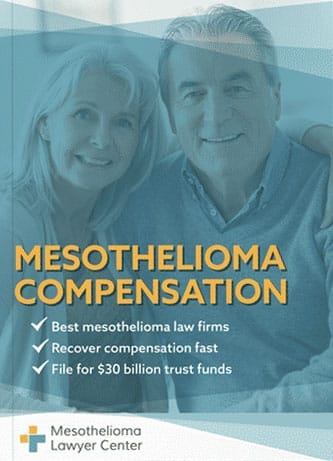Let a North Carolina mesothelioma lawyer assist you in fighting for justice and compensation if you’ve been exposed to and injured by asbestos. North Carolina has a long history of asbestos exposure via naturally-occurring deposits and industrial job sites.
If you or a loved one have been diagnosed with mesothelioma, asbestos-related lung cancer, or asbestosis, you may be entitled to substantial compensation. Fill out our form to receive our free Financial Compensation Packet. Our packet is loaded with information on experienced mesothelioma attorneys in North Carolina, how to file a claim for asbestos trust funds, how to get paid in 90 days, and more.


FREE Financial Compensation Packet
- Info on law firms that will recover your HIGHEST COMPENSATION
- Learn how to get paid in 90 days
- File for your share of $30 billion in trust funds
We help all North Carolina residents get the compensation they deserve in all cities, including:
Charlotte, Raleigh, Greensboro, Durham, Winston-Salem, Fayetteville, Cary, Wilmington, High Point, Greenville, Asheville, Concord, Gastonia, Jacksonville, Chapel Hill, Rocky Mount, Burlington, Huntersville, Wilson, Kannapolis, Apex, Hickory, Goldsboro, Indian Trail, Mooresville, Wake Forest, Monroe, Salisbury, New Bern, Sanford, Matthews, Holly Springs, Thomasville, Cornelius, Garner, Asheboro, Statesville, Mint Hill, Kernersville, Morrisville, Lumberton, Kinston, Fuquay-Varina, Havelock, Carrboro, Shelby, Clemmons, Lexington, Elizabeth, Boone, Lenoir, Clayton, Morganton, Hope Mills, Leland, Albemarle, Laurinburg, Roanoke Rapids, Eden, Henderson, Pinehurst, Stallings, Graham, Murraysville, Reidsville, Mount Holly, Harrisburg, Piney Green, Hendersonville, Knightdale, Lewisville, Newton, Spring Lake, Southern Pine,s Mebane, Davidson, Smithfield, Archdale, Tarboro, Waxhaw, Lincolnton, Kings Mountain, Summerfield, Mount Airy, Belmont, Weddington, Washington, Dunn, Waynesville, Winterville, Elon, Rockingham, Morehead City, Clinton Half Moon, Oxford St., Stephens, Myrtle Grove, Kings Grant, Roxboro, and more.
North Carolina Asbestos Facts

- In North Carolina, 6.557 residents died from diseases related to asbestos during the period from 1999 to 2017.
- This ranks North Carolina among all the states for asbestos-related deaths.
- There were 1,159 deaths from mesothelioma, 828 from asbestosis, and the rest were a result of lung cancer.
- Wake and Mecklenburg Counties had the most deaths during that time related to asbestos.
The Connection Between Asbestos and Mesothelioma
If you have a mesothelioma diagnosis, you were probably exposed to asbestos at work years ago. Asbestos is a mineral used by many industries in the past, including several that operated in North Carolina.
When workers handled asbestos materials, they shed fibers that became part of the dust in the air and on surfaces. Anyone in the area could inadvertently inhale or ingest these fibers. Inhaling or ingesting asbestos fibers can cause mesothelioma to develop 10-50 years after initial exposure. The fibers cause damage in the body, leading to mesothelioma, lung cancer, or asbestosis many years later.
If you worked in construction or manufacturing, in shipyards, as an insulator or plumber, in power plants, or many other North Carolina industries, you could be at risk for mesothelioma now. Understanding the timeline and potential health risks can help in seeking medical advice and exploring legal options for compensation.
The long latency period between exposure and the onset of symptoms highlights the importance of awareness and early detection. Stay informed and consult with healthcare professionals if you suspect past exposure to asbestos.
Why Should I Sue for Mesothelioma in North Carolina?

Most people sue for mesothelioma to seek compensation. Most cases of mesothelioma results from negligent asbestos exposure, and the companies responsible should be held to account.
Mesothelioma is also a costly disease requiring specialist treatment. Compensation from a lawsuit or claim can help cover these high costs, as well as others.
Why Do I Need a North Carolina Mesothelioma Lawyer?
An experienced mesothelioma lawyer who is part of a larger asbestos firm can help you in several ways:
- Offering a free initial consultation to review your case
- Providing expert investigators to find proof of your asbestos exposure and build a strong case
- Finding all the expenses this illness has caused you to maximize your compensation
- Negotiating a fair settlement from the defendants
- Litigating in court if necessary
- Providing contingency payment, so you risk nothing, and you pay no fees until they win
- Coming to you when you are unable to travel
Each senior attorney works within a small, dedicated team that includes several experienced attorneys, legal staff members, and registered nurses. This collaborative team approach ensures that you receive personalized attention throughout every stage of your case. With specialized support tailored to your unique situation, the legal team is equipped to address both the legal complexities and the personal needs of your case. This framework not only strengthens your legal strategy but also provides compassionate care, ensuring you and your family have a strong support system during challenging times.
How Do Mesothelioma Lawsuits Work?
The process of filing an asbestos lawsuit can be complicated. Rely on a top North Carolina mesothelioma lawyer to take all the steps for you. They will begin by reviewing your case and explaining your options, which might include:
- Filing a mesothelioma personal injury lawsuit
- Filing a mesothelioma wrongful death lawsuit
- Making a claim with an asbestos trust fund
- Claiming veteran benefits through the VA
A lawsuit begins with a filing and then building a case with evidence. A lawyer uses your work history and expert investigators to prove which companies exposed you to asbestos. Medical experts connect that exposure to your illness.
Most asbestos lawsuits end in a settlement. Occasionally they go to trial, where the plaintiff seeks a jury award.
If you’re considering filing a mesothelioma claim, it’s crucial to be aware of the time constraints imposed by the statutes of limitations. Each state has specific deadlines, and you typically have a limited period after diagnosis to initiate your lawsuit. Once these deadlines pass, the opportunity for legal recourse is lost.
Acting swiftly is essential. Initiating the process promptly not only ensures you meet the legal deadlines but also strengthens your case as evidence and witness testimonies remain fresh. Our team can guide you through this time-sensitive process, providing clarity on your remaining time to file and the best course of action.
Understanding the usual progression of such cases—where settlements are common—can also help set realistic expectations as you navigate your legal options.
Bankrupt asbestos companies set up asbestos trust funds. Your lawyer can determine if you are eligible to make a claim with one or more trusts.
If you served in the military, you might have been exposed to asbestos through bases, military equipment, or U.S. Navy ships. If so, you could be entitled to important benefits.
Understanding the Mesothelioma Lawsuit Process in North Carolina
Filing a mesothelioma lawsuit in North Carolina involves several key steps, each designed to help victims seek justice and compensation. The process is methodical and requires strategic planning with a dedicated legal team. Here’s a straightforward guide to help you grasp what’s involved:
Initial Consultation and Case Evaluation
- Assessing Your Case: The first step involves a detailed evaluation of your situation by experienced mesothelioma lawyers. This helps determine the viability of your case based on the specifics of your asbestos exposure.
Building Your Legal Team
- Dedicated Support: You will collaborate with a legal team comprising senior attorneys, specialized legal staff, and often medical experts like registered nurses. This team ensures you receive focused attention and expertise as your case progresses.
Exploring Compensation Avenues
- Asbestos Trust Funds: Many companies have established trust funds to compensate asbestos victims. With an estimated $30 billion available, you may be eligible to claim without needing a court appearance.
- Filing a Lawsuit: Initiating a lawsuit is another path, allowing you to hold responsible companies accountable. This can result in substantial compensation, addressing both current and future needs.
- Veterans’ Claims: Given that a significant number of mesothelioma cases involve veterans, applying for Veterans Affairs (VA) benefits is an option. These benefits provide healthcare and financial support to affected service members.
Handling the Legal Process
- Evidence Gathering: Your legal team assembles necessary documentation and evidence to support your case, such as medical records, employment history, and expert testimonies.
- Submitting Your Claim: Timing is crucial, as filing deadlines exist. Your team will ensure that your claim is submitted promptly and accurately, safeguarding your right to compensation.
Throughout the journey, your lawyers will manage each stage of the legal process, aiming to alleviate stress and ensure you can focus on your health and well-being. With strategic guidance, you can navigate this complex process and pursue the justice you deserve.
How Mesothelioma Lawyers Have Financially Assisted North Carolina Clients
Mesothelioma lawyers in North Carolina have played a crucial role in providing financial relief to individuals and families affected by asbestos-related illnesses. By securing significant settlements and verdicts, these legal experts have eased the financial burden on those suffering from mesothelioma.
Notable Financial Outcomes
- Secondhand Exposure Case
- Result: $9.6 Million
- Location: Monroe, NC
- Boiler & Valve Technician Case
- Result: $4.6 Million
- Location: Wilson, NC
- Union Electrician Case
- Result: $5.4 Million
- Location: New Bern, NC
These cases highlight the substantial compensation that can be achieved through skilled legal representation, helping clients manage medical expenses and pursue justice against responsible parties.
Tailored Legal Representation
Mesothelioma attorneys provide personalized legal strategies that consider each client’s unique circumstances. Factors such as the individual’s level of exposure, age, and specific diagnosis influence settlement amounts, ensuring that each client receives the compensation they deserve. As the outcomes vary, legal teams focus on crafting the best possible case for each person involved.
In summary, mesothelioma lawyers in North Carolina effectively secure financial assistance for their clients, ensuring that medical costs and other related expenses are covered. This diligent work not only supports affected families financially but also holds accountable those responsible for asbestos exposure.
Where Was I Exposed to Asbestos in North Carolina?
Most people with mesothelioma were exposed to asbestos at work. North Carolina has several industries that used asbestos and exposed workers. There are also deposits of asbestos that pose risks and the ongoing risk of asbestos that remains in older buildings.
Naturally-Occurring Asbestos in North Carolina
Most victims of asbestos were exposed on the job. However, North Carolina also has natural deposits of asbestos that put residents at risk.
Asbestos deposits are found primarily in eight counties in the Appalachian Mountains and the outlying foothills. Jackson County has the most naturally-occurring asbestos sites, with at least 21 deposits.
The other seven counties with large asbestos deposits include:
- Ashe County
- Avery County
- Caldwell County
- Macon County
- Mitchell County
- Transylvania County
- Yancey County
Asbestos in Vermiculite Processing
According to the Environmental Working Group (EWG), 208 cities throughout the U.S. received shipments of vermiculite contaminated with asbestos from mines in Libby, Montana, and elsewhere before 1979.
In all, 5.8 million tons of asbestos-tainted vermiculite were sent to American communities, putting residents and workers at risk.
The North Carolina community of High Point received 150 asbestos-contaminated vermiculite shipments totaling 10,108 tons. It shipped to a processing plant in High Point owned by the Carolina Vermiculite Company and later by W.R. Grace.
Carolina Asbestos Company
North Carolina was once home to an asbestos company. The Carolina Asbestos Company had a facility in Davidson that operated through the 1960s. Both workers and nearby residents were at risk of exposure and are now at risk of being diagnosed with mesothelioma.
The Davidson asbestos plant site was capped in 1984. The protection was breached by a flood in 2016, again putting residents at risk of asbestos exposure.
Fort Bragg

Veterans have high rates of mesothelioma because of the heavy use of asbestos in the military. This includes exposure at bases like Fort Bragg in North Carolina. While much of the exposure occurred decades ago, aging buildings continue to pose a risk.
In 2008, soldiers at Fort Bragg were told to remove flooring tiles that contained asbestos. They worked for more than a week on the project without proper protective gear.
Other military sites in North Carolina that put service members and civilian workers at risk of asbestos exposure include Johnson Air Force Base and Marine Corps Base Camp Lejeune.
Other North Carolina Job Sites With Known Asbestos
Until the mid-1970s, many industries used asbestos-containing materials (ACMs) as insulation, fire retardants, and heat-resistant materials. Facilities where fire and high temperatures were part of the operational process often contained large quantities of ACMs.
North Carolina is home to several of these industries and workplaces, including heavy manufacturing, aviation and aerospace businesses, defense jobs, automotive plants, and pharmaceutical companies.
Many of the job sites added asbestos to protect property, equipment, and workers from fire or electrical discharges. Asbestos was used to insulate wiring, steam pipes, and even interior walls.
Some of the job sites in North Carolina known to have had asbestos exposure issues include:
- Allied Chemical plant in Wilmington
- Weyerhaeuser Company facility in New Bern
- Liggett & Myers Tobacco Company factory in Durham
- Carolina Power & Light generating plant in Georgetown
- John Umstead Hospital in Butner
- Babcock & Wilson boiler factory in Wilmington
- Gibson Manufacturing Company facilities in Concord
- Owens Corning Fiberglass factory in Charlotte
- Appalachian State University student dormitories in Boone
- Friendship Missionary Baptist Church in Hickory
- Hickory Plumbing in Hickory
- Seymour Johnson Air Force Base in Goldsboro
- Pope Air Force Base in Manchester
- Camp Lejeune Marine Corps Base in Onslow County
- Cherry Point Marine Corps Air Station in Cherry Point
- Ft. Bragg Army installation in Fayetteville
Asbestos Laws in North Carolina
State laws in North Carolina regulate current asbestos handling to protect residents and workers. Other laws determine how asbestos lawsuits proceed.
North Carolina’s Asbestos Safety Laws
North Carolina has state-specific laws and also follows federal laws when it comes to asbestos abatement:
- There are three county ordinances for asbestos-related issues, including Forsyth, Buncombe, and Mecklenburg counties.
- 40 CFR Part 763; NC Gen. Stat. §130A-444 through §130A-451 of the Asbestos Hazard Emergency Response Act (AHERA) states that any school that was built using asbestos-containing materials must have regular maintenance and inspections. An emergency plan must always be in place.
- 10 N.C.A.C. 10G .0505 mandates that asbestos can only be disposed of in approved North Carolina landfills.
- 49 CFR 173.1090 mandates that the North Carolina Department of Transportation is responsible for the enforcement of the transportation of asbestos to landfills.
- A permit must be granted from the state before any asbestos abatement project.
For more detailed information and additional asbestos-related regulations in North Carolina, contact the NC Department of Health and Human Services Division of Public Health at 919-707-5950.
Statute of Limitations for Asbestos Lawsuits in North Carolina

- The deadline to file a lawsuit for asbestos-related cases differs according to state.
- In North Carolina, these types of cases are treated as personal injury cases and therefore follow the personal injury statute of limitations.
- The personal injury statute of limitations in North Carolina is three years from when the injury was discovered and diagnosed.
- Wrongful death lawsuits must be filed within two years from the date of the victim’s death.
Asbestos Trust Fund Claims Transparency Act
North Carolina is among several states that passed a law making it more difficult for asbestos victims to recover damages. In 2018, the state passed a law that requires plaintiffs filing asbestos lawsuits to disclose any asbestos trust fund claims they have made or plan to make.
These disclosures allow the courts to reduce the amount of compensation an asbestos victim receives from a lawsuit.
Getting Mesothelioma Treatment in North Carolina
If you have been diagnosed with mesothelioma, it is essential that you seek treatment as soon as possible. Specialist care is best, as this is a rare disease that most physicians and oncologists have little experience with.
There are three comprehensive cancer centers in North Carolina:
- Duke Cancer Institute, Duke University Medical Center, Durham
- Wake Forest Baptist Comprehensive Cancer Center, Winston-Salem
- Lineberger Comprehensive Cancer Center, University of North Carolina, Chapel Hill
These cancer centers offer expert cancer specialists, cutting-edge treatment options, and access to clinical trials.
When my husband was diagnosed we had no idea what to do. Our doctor said we should reach out to an attorney to talk about compensation. After talking to several firms we found the mesothelioma lawyer center and were grateful we did. They helped with every step of the way. If you need a meso attorney then I would recommend contacting them
– Isabelle D.
Legal Assistance in North Carolina
If you or a loved one have been a victim of mesothelioma, asbestos-related lung cancer, or asbestosis, it’s important to understand your legal rights and what compensation you may be entitled to. Remember to fill out our form to get your free Financial Compensation Packet, with information on experienced asbestos and mesothelioma lawyers in your area. For questions and assistance, feel free to contact us at 800-793-4540.
Call (800) 326-8900 now to directly connect with our North Carolina mesothelioma lawyers for a free consultation. They can help you assess your situation and guide you through the legal process. Don’t wait—take the first step towards securing the compensation you deserve.

Paul Danziger
Reviewer and EditorPaul Danziger grew up in Houston, Texas and earned a law degree from Northwestern University School of Law in Chicago. For over 25 years years he has focused on representing mesothelioma cancer victims and others hurt by asbestos exposure. Paul and his law firm have represented thousands of people diagnosed with mesothelioma, asbestosis, and lung cancer, recovering significant compensation for injured clients. Every client is extremely important to Paul and he will take every call from clients who want to speak with him. Paul and his law firm handle mesothelioma cases throughout the United States.
Connect with North Carolina Mesothelioma Lawyer Paul Danziger
References
- Environmental Working Group. (n.d.). Asbestos: Think Again.
Retrieved from: http://www.ewg.org/research/maps/deaths-due-asbestos-related-diseases - Environmental Working Group. (n.d.). Asbesos-Related Deaths in North Carolina.
Retrieved from: http://www.asbestosnation.org/facts/asbestos-deaths/nc/ - North Carolina Department of Health and Human Services. (2006). Screening of Historic Asbestos Mines, Historic Asbestos Prospects, and Natural Asbestos Occurrences in North Carolina.
Retrieved from: http://epi.publichealth.nc.gov/oee/noa/docs/NC%20NOA%20Site%20Screening%20Summary%20Report.pdf - MilitaryBases.com. (n.d.). North Carolina Military Bases.
Retrieved from: http://militarybases.com/north-carolina/ - North Carolina Department of Health and Human Services. (2021, February 9). Asbestos Hazard Management.
Retrieved from: http://epi.publichealth.nc.gov/asbestos/rules.html - North Carolina Environmental Quality. (n.d.). Davidson Asbestos Site Information – Davidson, N.C.
Retrieved from: https://deq.nc.gov/about/divisions/waste-management/superfund-section/inactive-hazardous-sites-program/davidson-asbestos-site-information-davidson-nc - WTVD-TV Raleigh-Durham. (2008, December 10). Fort Bragg: Soldiers Were Exposed.
Retrieved from: https://abc11.com/archive/6547116/ - O’Brien, J. (2018, May 24). With Bipartisan Support, Asbestos Transparency Bill Passes in North Carolina. Legal Newsline.
Retrieved from: https://legalnewsline.com/stories/511427322-with-bipartisan-support-asbestos-transparency-bill-passes-in-north-carolina - National Cancer Institute. (n.d.). Find a Cancer Center. North Carolina.
Retrieved from: https://www.cancer.gov/research/infrastructure/cancer-centers/find#NorthCarolina
